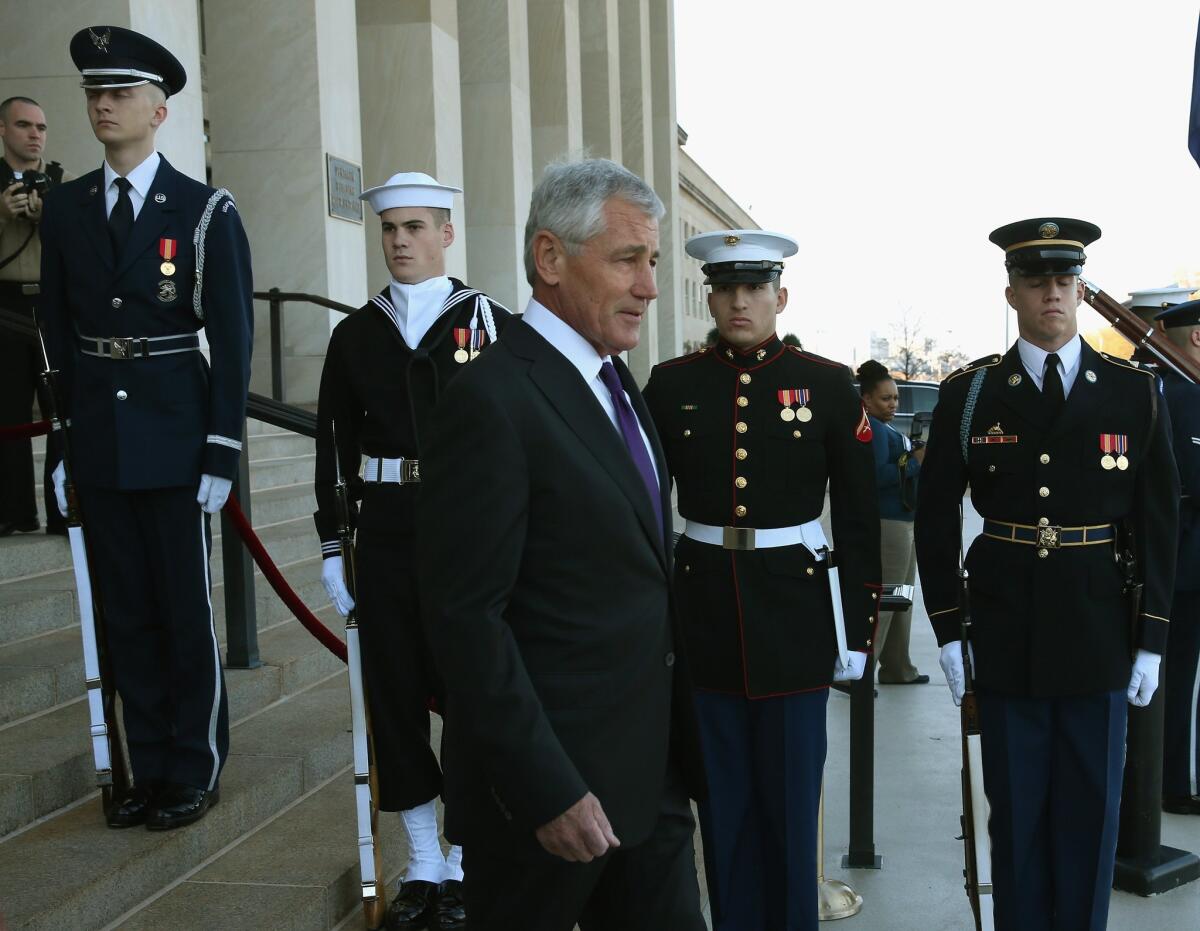Op-Ed: Chuck Hagel’s firing won’t help U.S. foreign policy

- Share via
It is a time-honored tradition in American politics: Whenever the president turns unpopular, he fires someone and brings in a tried and tested veteran to clean house. Thus in 1987, in the middle of the Iran-Contra affair, out went Donald Regan as Ronald Reagan’s White House chief of staff, to be replaced by steady old hand Howard Baker. In 1994, after Bill Clinton had stumbled on issues including gays in the military and healthcare, out went Mack McLarty as White House chief of staff, to be replaced by steady old hand Leon E. Panetta. In 2006, after the disasters of the Iraq war and the loss of the Senate to Democrats, out went Donald H. Rumsfeld as George W. Bush’s defense secretary, to be replaced by steady old hand Robert M. Gates.
At a superficial level, President Obama’s firing of Chuck Hagel as defense secretary conforms to this pattern. With 54% of the public disapproving of the president’s foreign policy, which has produced disasters in Iraq, Syria and Ukraine, among other places, someone had to pay the price. The problem is not that Hagel shouldn’t have been fired — he was pretty much a nonentity as defense secretary. The problem is that firing him is not going to change much, if anything.
Indeed, the reason he was jettisoned is precisely because he had so little influence on real decision-making, which is tightly controlled by a small coterie of White House aides such as national security advisor Susan Rice, White House Chief of Staff Denis McDonough, deputy national security advisors Ben Rhodes and Tony Blinken and senior advisor Valerie Jarrett. That crew is responsible for steering the Good Ship Obama onto the rocks, but because they are so tight with the skipper, they remain at the helm.
Even when there were strong defense secretaries in charge, they found themselves endlessly frustrated by their dealings with imperious White House aides who mistook themselves for field marshals. Just read the memoirs of Bob Gates and Leon Panetta. Gates, for example, complained that the White House staff had “a presence and a role in national security decision making that I had not previously experienced.” That extended to White House staffers directly calling field commanders — an action that “would have been unthinkable when I worked at the White House,” Gates wrote, “and probably cause for dismissal.”
No doubt Hagel was similarly disturbed by White House intrusions but, ever the dutiful NCO, he has so far largely kept his dissatisfactions to himself. On those few occasions when he expressed candid thoughts, however, the White House hammered him for insubordination. For example, this year, while Obama was foolishly deriding Islamic State as the “JV team,” Hagel called it an “imminent threat … beyond anything we’ve seen.” White House aides leaked word that such comments were “unhelpful,” even though (or because?) they were undeniably true. The White House no doubt also didn’t appreciate a memo that Hagel sent in recently questioning the “overall Syria policy” even though that policy is plainly incoherent — Obama is allowing President Bashar Assad to continue the terror bombing of areas held by the Free Syrian Army, the forces that the White House is counting on to fight Islamic State.
By all means, Obama should appoint a stronger and more independent defense secretary, especially one who, unlike Hagel, will fight strongly to reverse budget cuts (amounting to $1 trillion over 10 years) that will cripple U.S. military capabilities even as the world situation turns more dangerous. But that will not fix the fundamental problem, which is in the White House — and not just with the president’s aides.
Ultimately the buck stops at the Oval Office, not at the Pentagon. Obama has to take ownership of the disaster that is his foreign policy and make dramatic changes. Here are a few ideas: Announce that U.S. troops won’t be leaving Afghanistan at the end of 2016 as currently scheduled. Provide arms to enable the Ukrainians to defend themselves against Russian aggression. Enforce a no-fly zone over Syria to stop Assad’s air force from killing more civilians. Step up airstrikes against Islamic State (currently running at one-tenth the level of the airstrikes against the Taliban in the fall of 2001). Suspend the Iran nuclear talks, which have now dragged on for more than a
year, and announce that Iran
will face crippling sanctions and possible airstrikes if it doesn’t stop building a nuclear weapon. Call for Congress to suspend sequestration and fully fund the military.
Only such dramatic steps can fix the malaise that has overtaken American foreign policy. Firing Hagel, however justified, is of little consequence compared with the policy overhaul that Obama needs to institute.
Max Boot is a senior fellow at the Council on Foreign Relations and a contributing editor to Opinion.Follow the Opinion section on Twitter @latimesopinion
More to Read
Sign up for Essential California
The most important California stories and recommendations in your inbox every morning.
You may occasionally receive promotional content from the Los Angeles Times.













